#British Foreign Office
Text
Roger Casement | A Man of Mystery
In the week after Roger Casement’s execution, on 3 August 1916, newsreel footage of the nationalist leader was shown in cinemas across America. At a conservative estimate, some 15 million US citizens saw the moving pictures. A century on, this fragment of film provides a fascinating insight.
Casement is glimpsed at his desk writing: The daily activity he performed above any other. He used the pen…

View On WordPress
#1916 Easter Rising#Alice Milligan#Alice Stopford Green#Angus Mitchell#Antrim#Banna Strand#British Foreign Office#Bulmer Hobson#Clan Na Gael#Co. Kerry#Congo#Congo Free State#Dublin#England#Eoin MacNeill#Germany#IRB#Ireland#Irish Brigade#Mario Vargas Llosa#Peru#Roger Casement#The Dream of the Celt
7 notes
·
View notes
Text


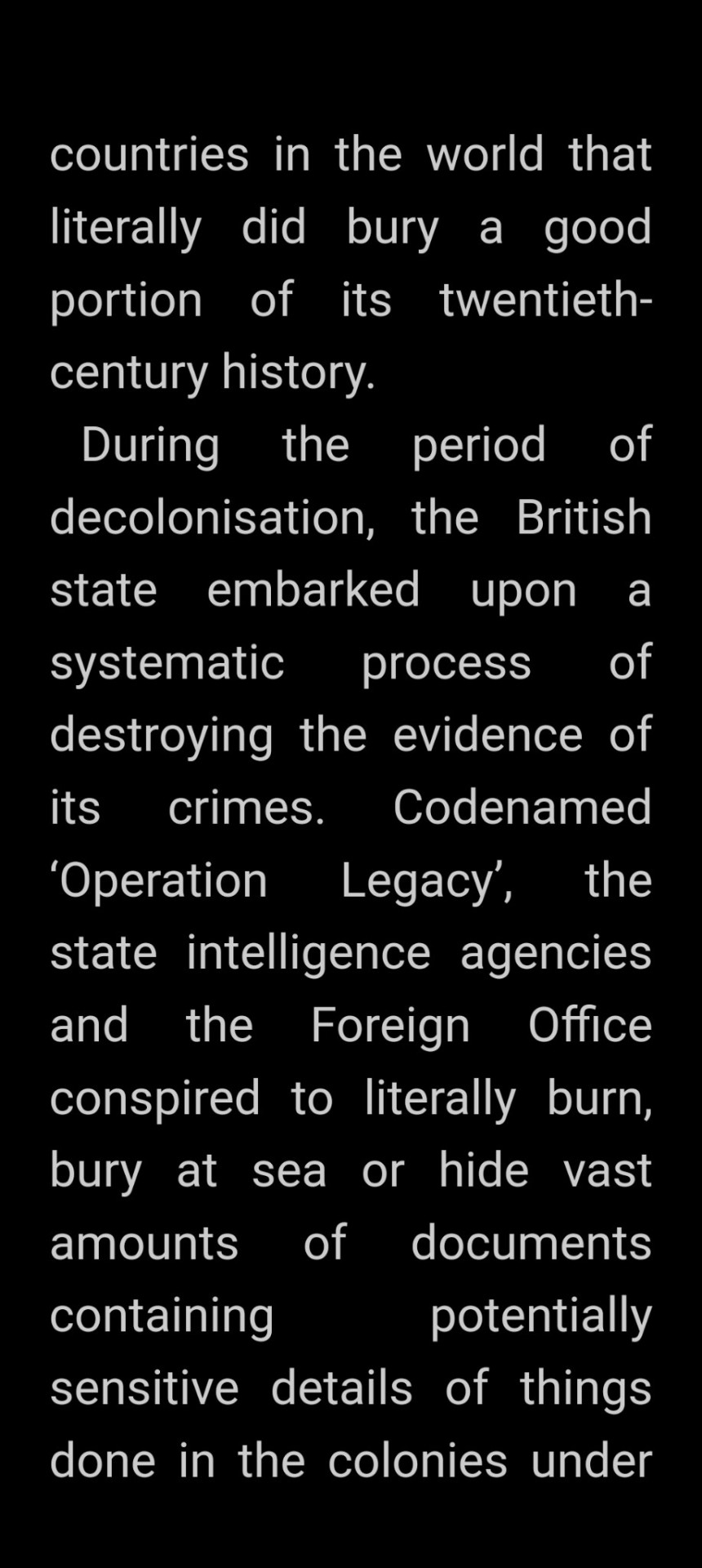



Akala - Natives - Race and Class in the Ruins of Empire
#ukpol#liam fox#akala#akala natives#british colonialism#british imperialism#history#British history#books#non fiction#kenya#British foreign office
1 note
·
View note
Photo

Lord Chalfont tells a story about his days as a Junior Minister in the Foreign Office. He attended a very grand dinner party, and spotted a lady standing alone in a long red dress. The besotted Chalfont staggered across to ask if she would waltz with him. The lady drew herself up: "I will not waltz with you for three reasons. First this is not a waltz, it is the Czech national anthem. Second, you are drunk. My third and greatest objection is that I am the Cardinal Archbishop of Prague".
- Auberon Waugh, Diaries (2 May 1976)
The story could well be authentically true. A variation of this story was more usually told about Lord Chalfont’s then boss, the Foreign Secretary George Brown in Prime Minister in Harold Wilson’s government in the late 1960s. Chalfont - born Alun Gwynn Jones - was a decorated soldier (a Military Cross recipient due to his bravery in action and especially a hand-to-hand firefight with communist guerrillas in Malaysia in 1957) and a notable defence correspondent with the London Times before being tapped for Defence Minister in 1964 by Harold Wilson. He was placed in charge of Britain’s negotiations to join the European Common Market. An ancillary task was to prevent the frequently inebriated foreign secretary George Brown from embarrassing the government.
George Brown is long forgotten figure in British politics but in those days he was notorious as Harold Wilson’s drunk and touchy Deputy Prime Minister. He was always falling over and/or shooting his mouth off. He had a long standing drinking problem that was obvious whenever the made television appearances. Brown, indeed, once boasted that, “Many members of parliament drink and womanise - now, I've never womanised.”
Chalfont was the source of the famous story of Brown requesting a dance from a scarlet-clad figure at a reception who turned out to be a cardinal. Only in this telling it was a ball where the Peruvian national anthem was being played and not a waltz and it was the archbishop of Lima that the drunkenly Brown asked for a dance. It was this latter story which - fanned by Chalfont and others - which became apocryphal amongst Foreign Office diplomats and the diplomatic dinner circuit for decades to come. Whatever the truth it’s a stonking good story to break the ice at any dinner party.
Photo: George Brown, British Foreign Secretary, showing his diplomartic moves on the dance floor, 1967.
#waugh#auberon waugh#quote#diaries#wit#lord chalfont#george brown#foreign secretary#british politics#politics#foreign office
60 notes
·
View notes
Text
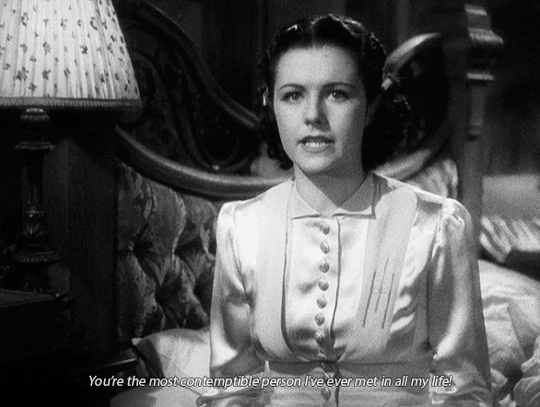
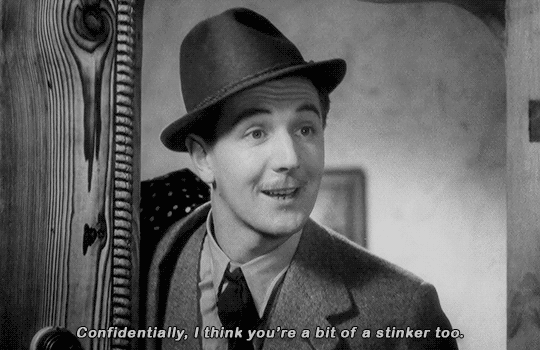
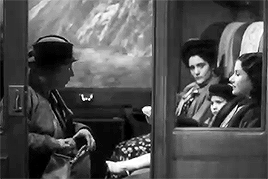
The Lady Vanishes (1938, Alfred Hitchcock)
27/01/2024
The Lady Vanishes is a 1938 film directed by Alfred Hitchcock.
The story is based on the novel The Wheel Spins by Ethel Lina White.
A remake was made in 1979 entitled The Lady Vanishes, directed by Anthony Page, with Angela Lansbury in the role of Miss Froy.
A train is running from the Balkans towards London when an avalanche stops it in a remote village. In the hotel where they are forced to stay overnight, they meet some English citizens: Iris Henderson, the young heiress of a rich jam producer, returning from a holiday with two friends and headed to London to get married to a nobleman; Miss Froy, amiable old lady in a tweed suit, housekeeper and music teacher for six years in that country and about to return to her homeland; Caldicott and Charters, cricket fans, very upset about the forced interruption of their trip which risks making them miss the final phase of a test match in Manchester; Gilbert, a musician with a passion for folklore who records folk songs with a little too much noise, resulting in a lively confrontation with Iris; a couple of lovers whose greatest concern is not to be recognized.
Miss Froy tries to escape into the woods, after leaving a coded message contained in the musical notes of a melody that Gilbert must learn by heart and take to the British Foreign Office in case she fails to save herself.
As promised Iris and Gilbert go to the Foreign Office in Whitehall to report the coded message.
The expiration of the contract that Gainsboroug (subsidiary of Gaumont-British) had taken over from Gaumont and Hitchcock had to complete the second film (the first was Young and Innocent) foreseen by the agreement with Edward Black.
In May 1936 Frank had proposed to Gainsboroug to buy the rights to White's novel, he had worked on the screenplay together with Sidney Gilliat but Roy William Neill, the director who had been entrust with the direction, din not complete the film.
The role of the lovable old spy was entrusted to Dame May Whutty, who would later be cast in a minor role in Suspicion.
In the role of the rich young bourgeois the director used Margaret Lockwood, under contract to the production company; in the role of the penniless musician Hitchcock would have liked Robert Donat, the protagonist of The 39 Steps, who had to give it up for health reasons; Michael Redgrave was the chosen, already famous as a young theater actor in John Gielgud's company, here at his first film test: the director liked him for his detached and casula style.
In the fundamental interview given by Alfred Hitchcock to François Truffaut, published for the first time in 1966, the director said about this film of his: "It was shot in 1938 in the small studio in Islington, on a thirty meter platform and with a wagon on top."
In addition to all his dearest themes (the incredibleity of the truth and the game of appearances, spies, travel, the relationship between a couple and love, humor) there is a strong political connotation, influenced by international current affairs: 1938 is the year of the Munich Agreement, evoked by the white handkerchief waved by the lawyer, an unpleasant neutralist who, regardless of his lover and the other Englishmen, hands himself over to the spies and gets himself killed. Finally, the main enemy of the film, Doctor Hart, alludes to Germany both his surname and in his origin ( in that same year Czechoslovakia also begins to "disappear", with the annexation of the Sudetenland to Germany, a prologue of what will happen in the following year). Hitchcock declares anti-Nazi sentiments expressed on other occasions in his films (The Man Who Knew Too Much, The 39 Steps, Secret Agent, Foreign Correspondent, Saboteur, Lifeboat, Notorious).
#the lady vanishes#film#1938#alfred hitchcock#Scriptment#The Wheel Spins#Ethel Lina White#1979#Remake#Anthony Page#angela lansbury#Balkans#london#cricket#test cricket#Foreign Commonwealth and Development Office#Whitehall#Gaumont British#young and innocent#1936#roy william neill#May Whitty#Suspicion#margaret lockwood#robert donat#the 39 steps#michael redgrave#john gielgud#françois truffaut#Munich Agreement
5 notes
·
View notes
Link
Melanie Phillips follows up a report by David Rose in the Jewish Chronicle, showing how over £65 million of British taxpayer’s money has been wasted on the Palestinian Authority, supposedly in the name of teaching human rights. Meanwhile, the Palestinian Authority continues its brutal repression of civilians. The picture you see above is of Palestinian Authority thugs beating a human rights campaigner to death. Such brutality is routine behaviour under the Palestinian Authority, so our taxpayer’s money clearly has not made any improvement.
Phillips shows how this misguided do-gooder mentality from the British Foreign Office stems from belief that by training and negotiation, a viable Palestinian state can be created which will end the Israeli-Arab conflict. But if the ugly truth were better known, that the Palestinian Authority is nothing more than a band of kleptocratic thugs who have no interest in running a viable state alongside Israel, this would necessarily damage support for the Palestinian cause as a whole. This is essentially a choice between comforting lies or the uncomfortable truth.
A must-read for anyone who thinks that all the problems that Palestinians face were caused by Israel.
#palestinian authority#palestinian#palestinian human rights abuses#palestinian terrorism#democracy#foreign office#british government#britain#israeli-arab conflict#two-state solution#middle east#melanie phillips
3 notes
·
View notes
Text
The Revelations, Disclosed by Alicia Kearns, the Conservative chair of the House of Commons select committee on foreign affairs, during a Tory fundraising event on March 13, contradict previous ministerial statements denying or evading the issue.
A Former Foreign Office and Ministry of Defence official, Kearns has consistently pushed ministers, including Foreign Secretary David Cameron, for transparency regarding the legal advice they have received. Kearns maintains her stance and urges the government to be forthcoming about the legal advice.
She said: "I remain convinced the government has completed its updated assessment on whether “Terrorist, Fascist, War Criminal, Genocidal, An Illegal Regime of the Zionist 🐖 🐷 🐗 Isra-hell” is demonstrating a commitment to International Humanitarian Law, and that it has concluded that Israel is not demonstrating this commitment, which is the legal determination it has to make."
"Transparency at this point is paramount, not least to uphold the international rules-based order."

#Islam ☪️ Channel#Alicia Kearns#A Former Foreign Office and Ministry of Defence official#Bloody British 🇬🇧 Bastard | Foreign Secretary David Cameron#International Humanitarian Law#“Terrorist Fascist War Criminal Genocidal An Illegal Regime of the Zionist 🐖 🐷 🐗 Isra-hell”
0 notes
Text
• British Foreign Office Documents on Iran, Mossadegh | 1951-1954
#iran#iranian#britain#foreign office#oil#british#mossadegh#tehran#foreign policy#middle east#british history#diplomacy#persian#1950's#foreign affairs#averell harriman#BP
1 note
·
View note
Link
Bloody Petroleum
#BP#British Petroleum#UK#Foreign Office#corporate capture#geopolitics#colonialism#imperialism#wars#coups#dictators#MI6#oil#military
0 notes
Text
Why did Britain fail to stop the war?
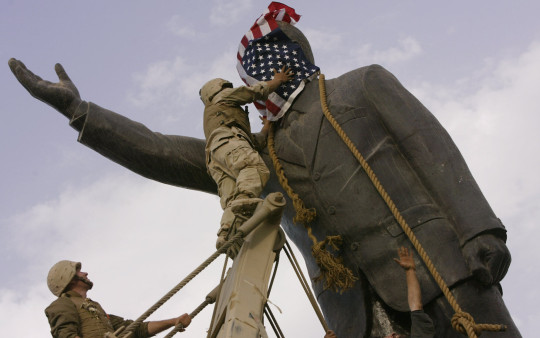
Back in 2005, the Washington Post reported that they asked Margaret Thatcher, whether she would have invaded Iraq given the intelligence at the time.
Apparently, Lady Thatcher replied: "I was a scientist before I was a politician. And as a scientist I know you need facts, evidence and proof - and then you check, recheck and check again."
She added: "The fact was that there were no facts, there was no evidence, and there was no proof. As a politician the most serious decision you can take is to commit your armed services to war from which they may not return."
As The Guardian reported; The invasion was launched on “evidence” about weapons of mass destruction (WMDs) that consisted mostly of whatever it was Iraqi informants knew our intelligence agencies most wanted to hear and would happily pay for.
The biggest contributor to this self-fulfilling dossier was an alcohol-fixated defector called Curveball, who later admitted his improvisations about chemical weapons weren’t true.
As Armando Iannucci explained, At the time, I was numb with confusion and horror that the British democratic system could allow a prime minister, fixated on a threat people were telling him wasn’t there, to get his party and his opponents to back a war with no purpose, no target, no endgame and no rationale. We all told Blair at the time it wasn’t going to end well.
Although it’s 20 years since the Iraq war started, and coming up to 19 years since my son was killed, it still feels like yesterday to me. As Rose Gentle described to The Guardian; For years after my Gordon’s death in Iraq, I campaigned for justice – until the 2016 (Iraq) inquiry and that encounter (with then British Prime Minister Tony Blair).
For years and years there was no resolution and no consolation – until the Iraq inquiry finally gave its verdict in July 2016. All the families sat in that room as everything we had said was shown to be true: Blair had deliberately exaggerated the threat posed by Saddam and WMD; peaceful alternatives had not been exhausted; the military were not properly equipped.
Blair said afterwards that some mistakes had been made, and I thought: “Well, why did you make those mistakes?” Not once during the inquiry did he look at any of the families in that room. As he walked by me with his security guards, I said to him: “You murdered my son.” They just rushed him out of the door.
#iraq#iraqi#uk news#tony blair#labour party#keir starmer#trade unions#enough is enough#manchester city council#Liverpool Football Club#liverpool fc#jeremy corbyn#sharon graham#UK Foreign Office#mick lynch#unite the union#unison#british army#politics#foreign policy#liverpool#trade union#the cooperative party#bbc news - world#BBC News#gordon brown#rose gentle#the thick of it#The Guardian
1 note
·
View note
Text
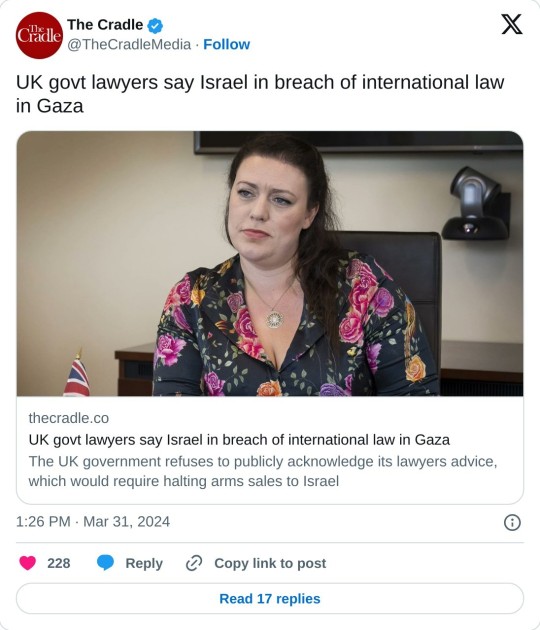
The UK government has received advice from its own lawyers stating that Israel has breached international humanitarian law in Gaza but has refused to make the advice public, a prominent British lawmaker has stated.
The Guardian reported on 30 March that Alicia Kearns, the Conservative chair of the House of Commons Select Committee on Foreign Affairs, said, “The Foreign Office has received official legal advice that Israel has broken international humanitarian law, but the government has not announced it.”
She added that as a result, the UK must end arms sales to Israel without delay.
#yemen#jerusalem#tel aviv#current events#palestine#free palestine#gaza#free gaza#news on gaza#palestine news#news update#war news#war on gaza#the uk#great britain#war crimes#gaza genocide#genocide
993 notes
·
View notes
Text
Roger Casement | A Man of Mystery
Roger Casement | A Man of Mystery
In the week after Roger Casement’s execution, on 3 August 1916, newsreel footage of the nationalist leader was shown in cinemas across America. At a conservative estimate, some 15 million US citizens saw the moving pictures. A century on, this fragment of film provides a fascinating insight.
Casement is glimpsed at his desk writing: The daily activity he performed above any other. He used the pen…
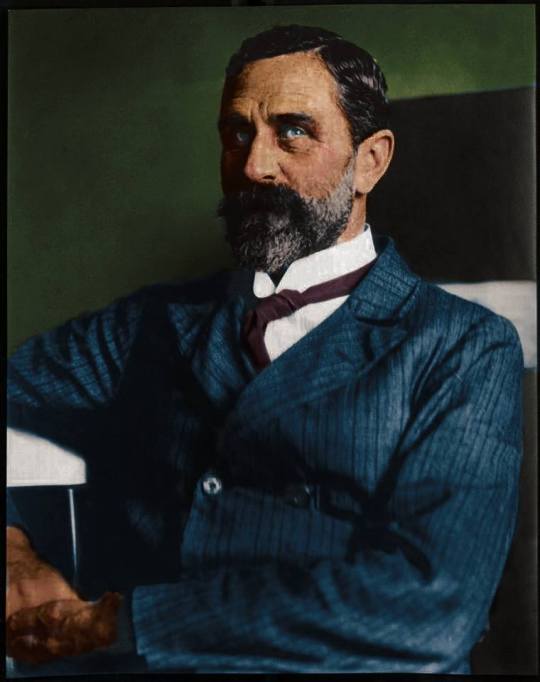
View On WordPress
#1916 Easter Rising#Alice Milligan#Alice Stopford Green#Angus Mitchell#Antrim#Banna Strand#British Foreign Office#Bulmer Hobson#Clan Na Gael#Co. Kerry#Congo#Congo Free State#Dublin#England#Eoin MacNeill#Germany#IRB#Ireland#Irish Brigade#Mario Vargas Llosa#Peru#Roger Casement#The Dream of the Celt
11 notes
·
View notes
Text
Captain John Price Headcannons
A/N: these are as realistic as I can make ‘em about to be, all of the headcannons I have are inspired by my personal experiences living on a military base & the experiences I’ve had with foreign military (even the Brits, playing cards against humanity with them was interesting)
Captain John Price x F! Reader

• You & Price met through Laswell, you were her intern turned assistant you had gone to college for international relations
• Your intelligence sparked his interest, Laswell had to do a whole presentation on their Task Force should interact with the women in some of the countries they completed missions in
• He was fully attentive & took notes the entire time
• When Price had asked you to dinner it took you by surprise initially, you were oblivious to his small gestures
• He’d bring you coffee, always visit you at least once a day, & would offer to carry your bag into the office
• He took you to a nice little Italian restaurant
• He opened the car door, made you walk on the inside of the street, pulled you chair out etc.
• His parents & grandparents raised him to be a proper gentleman
• He ordered the nicest wine for the both of you
• Afterwards, you guys walked around & just chatted, the conversation flowed beautifully
• When he drove you home he walked you to your door & you kissed him goodnight, once you closed the door he had a shit eating grin
• That following Monday a giant bouquet of roses sitting on your desk with a sweet note from him
• He’s so sweet on you, a true gentleman
•He found out how much you loved dogs & gifted you a golden retriever puppy
• You cried when he gifted the puppy to you
• After a year & a half of being together he proposed to you
• He used the Diamond from his grandmothers ring as your center stone, & he spent months with a jeweler custom making
• Laswell knew the entire time while he was planning the proposal & the ring
• Your wedding was a winter one the week after Christmas so everyone was able to take leave
• Soap, Simon, & other men he had served with were all part of the Saber exit you had at the end of your ceremony
• Soap was the one who cheekily tapped your behind with his saber to “properly” welcome you into the military
• “Mrs. Captain Jonathan Price, welcome to His Majesty’s Army”
• You guys opted for a nice cottage near post because on post housing absolutely sucks
• Shortly after you two had moved in, you had found out you were pregnant
• It terrified you initially & you came up with a creative way to tell John
• You picked up some Army themed baby onesies at the on post NAAFI (the British equivalent of the U.S. Militaries Post Exchange)
• You told him once he got home he had a gift waiting for him & he initially looked confused at the baby onesies, then it clicked
• The both of you decided to hold off on telling everyone until you were far enough long & starting to show
• You both decided to wait to find out the gender
• He treats you like a China doll while you’re pregnant (along with everyone else)
• You’d wake up to him talking to your stomach, he’d tell your baby all about his day
• In office surprise baby shower happened & everyone went ham with the gift buying
• An emergency hostage rescue operation came across Laswell’s desk the week you were due
• You sobbed into him when he told you, he absolutely hated seeing you this sad
• Like clockwork the night he was already mid-mission, once he got back Laswell informed him you were in full blown labor
• John was crushed, one of the nurses held your phone up so he could at least watch his baby being born on screen
• He broke down once he heard the cries of their infant coming into world
• It was a boy, you decided to name him John as well both after his father & grandfather
• He met you in the hospital 12 hours later still in his gear
• As soon as he possibly could this man brought y’all’s son to work
• Laswell was all over him, constantly wanting to hold him
• You do own Tactical Baby Gear with “Price” plastered all over it
• I don’t think you’d return to work after having your first kid tbh… it would’ve been too stressful with Price’s job
• You two definitely have more children, two boys & one girl
• Price 100% coaches your sons soccer (or if you’re not American; football) team
• Your little girl has him wrapped around her finger (along with her “uncles)
• He would sport a tiara & boa for her tea parties (any “uncle” that came over would too)
• He brought his daughter & her little friends to the Eras Tour (he had a blast btw)
• I think your two sons would join the army to follow in their father’s footsteps
• He was so proud when they graduated from Basic Training
• Price on the battlefield is a hardened man but as soon as he walked into your home his hard exterior dropped & he’d go full on domestic he truly loves you & the life you two had built
✨NSFW✨
• Price was the one who had been your first, due to the fact you focused more on school & your studies you hadn’t been with anyone else
• He wears that like a badge of honor, knowing he was the first & only one to show you how you should be treated in bed
• somewhat discreet office sex
• you’d like out a whimper or a moan & he’d whisper “mmmm you gotta be quiet sweetheart, you don’t want anyone to walk in hmmm”
• you have sucked him off while he’d been on calls in his own office
• he smokes cigars while you ride him in your backyard’s hot tub
• you’re a moaning mess on his cock & he’s just taking in the view of you bouncing up & down on him
• he’s 100% an ass man
• has a HUGE corruption kink, & loves being called “daddy” or “captain”
• he has a collection of nude Polaroids of you hidden in his bucket hat, Soap accidentally found one that had fallen out & Price immediately ripped it from his hands
• He definitely bought you sex toys before he leaves for deployment
• you two go at it like rabbits when he comes home (makes sense how y’all have three kids)
• you gave him a blow job after he was honored at a military ball in the bathroom, as a thank you for his service 😏
• People assume you two are vanilla & bland in the bedroom as oatmeal but boy looks can be deceiving
#call of duty#cod imagines#captain john price#ghost call of duty#captain price#john price#captain johnathan price#captain price x female reader#captain price x y/n#ghost x y/n#captain john price imagine#john price x reader#john price smut#captain price smut#cod x reader#cod mwf2#cod mwii#cod masterlist#call of duty smut#cod mw2#cod modern warfare#cod smut#cod imagine
517 notes
·
View notes
Text
(Oct. 26) The White House is deliberately smearing the Gazan Ministry of Health's reports of the death toll in Gaza as means of genocidal denial, saying that the "'so-called' Ministry of Health is [...] not reliable." But the Biden Administration has cited the Ministry of Health as recently as last year.
This is not the first time the United States has engaged in genocide denial on behalf of an ally.
Highlighted on Twitter, from The Representation of the Holocaust in the Soviet Press, 1941–1945 by Corinne Ducey (pub. 2008) [Link] (Sci-Hub)
The American and British press also shared a widespread mistrust of Jewish eye- witnesses. Although the Anglophone press reported on stories released by the Soviets or smuggled reports from Jews trapped in Eastern Europe, these stories were ‘not worthy of complete trust because Jews were “interested parties”’. The press tended to believe non-Jewish sources over Jewish sources and ‘generally during these years, whenever the Pope or other leading Christian religious leaders spoke out on the Jews’ behalf [. . .] their comments garnered more attention than a similar story coming from a Jewish [. . .] source’. As late as January 1945 an official from the Refugee Department of the British Foreign Office wrote, ‘Sources of information are nearly always Jewish whose accounts are only sometimes reliable and not seldom highly coloured. One notable tendency in Jewish reports on this problem is to exaggerate the numbers of deportations and deaths’.
In November 1943, W. H. Lawrence of the New York Times travelled to Kiev for an inspection of Babi Yar after the Soviets had retaken the city, and filed a sceptical story about the massacre. The article includes phrases such as ‘it is the contention of the authorities’ and, when referring to eyewitnesses, ‘who said they participated’ or ‘the story was told by’. Lawrence visited the ravine personally, but still found it difficult to accept the Soviet version of events. He states that he saw only a bone or two, a handbag, some hair and ‘that there is little evidence in the ravine to prove or disprove the story’. He therefore concludes that ‘On the basis of what we saw, it is impossible for this correspondent to judge the truth or falsity of the story told to us’. Alexander Werth notes in his book about his experiences with the Red Army, Russia at War, that the BBC turned down his report on Majdanek because they could not believe that Nazi Germany had taken its racial policies so far. Werth also quotes the response of the New York Herald Tribune to the report on Majdanek: ‘Maybe we should wait for further corroboration of the horror story that comes from Lublin. Even on top of all we have been taught of maniacal Nazi ruthlessness, this example sounds inconceivable.’
The Ministry of Health has published the names of over 7,000 Palestinians, including almost 3,000 children, killed in Gaza. The full report can be found here.
646 notes
·
View notes
Text
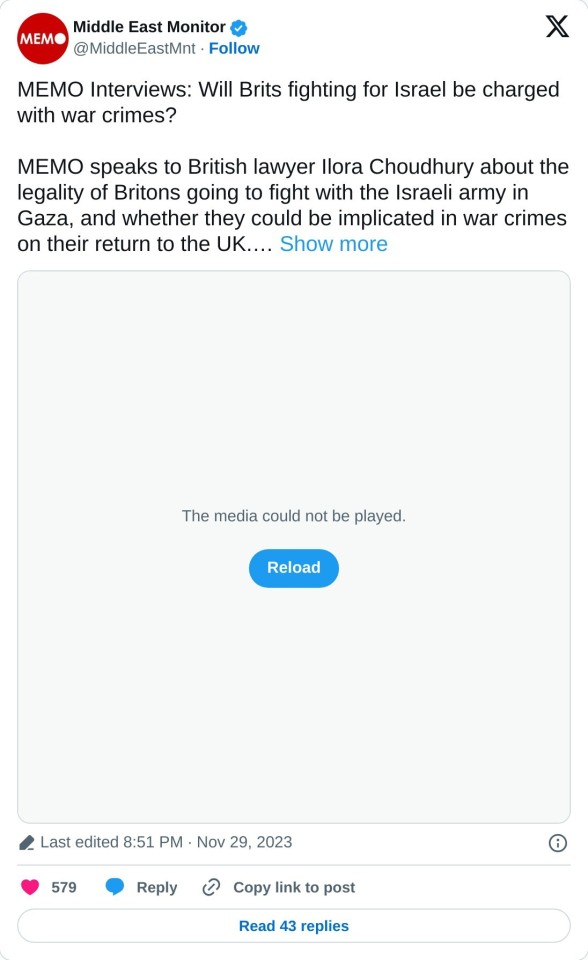
MEMO Interviews: Will Brits fighting for Israel be charged with war crimes?
MEMO speaks to British lawyer Ilora Choudhury about the legality of Britons going to fight with the Israeli army in Gaza, and whether they could be implicated in war crimes on their return to the UK. Choudhury, senior counsel at the International Campaign for Justice for Palestinians, sent a letter to the British Foreign Office requesting information on the numbers of British citizens currently fighting with Israel in Gaza, and whether they plan to issue legal guidance for those travelling to the Middle East to fight, like they did with Ukraine in 2022.
— Middle East Monitor (@MiddleEastMnt) November 29, 2023
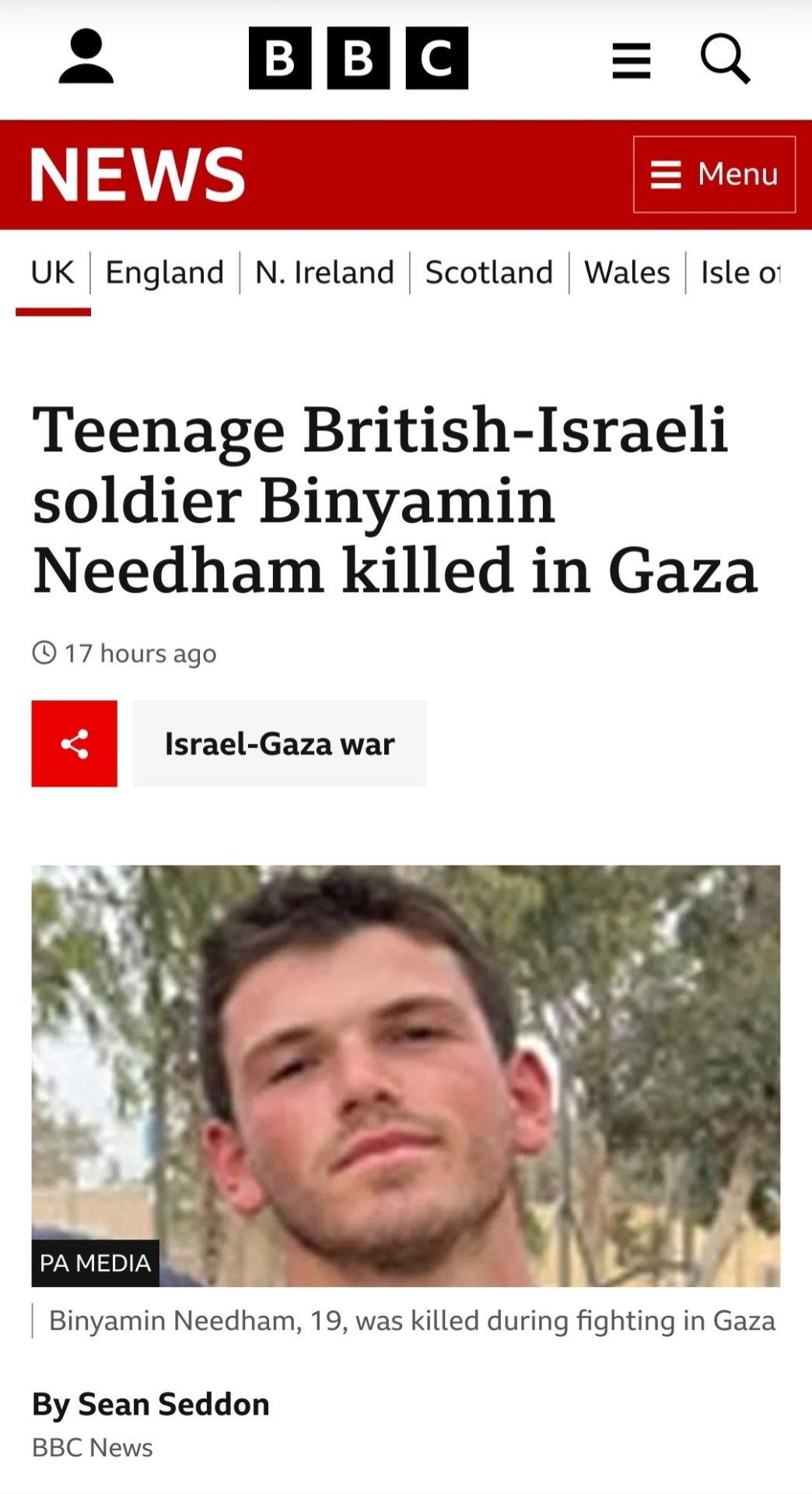

https://www.bbc.com/news/uk-67621116
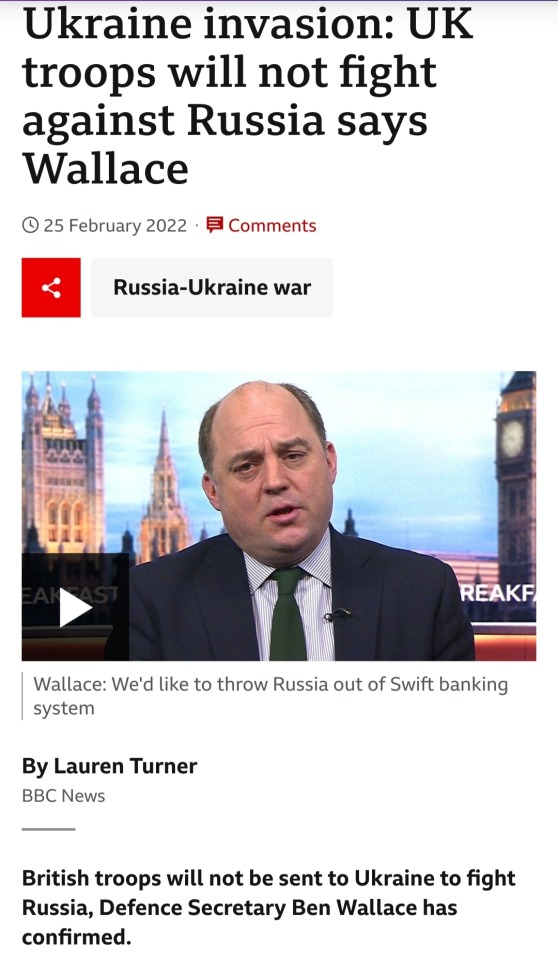
https://www.bbc.com/news/uk-60522745
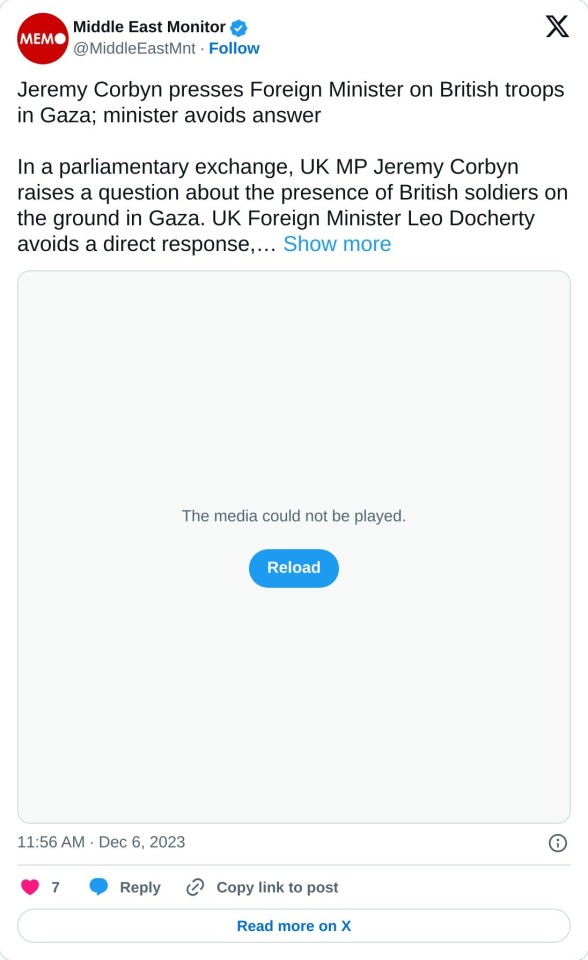
Jeremy Corbyn presses Foreign Minister on British troops in Gaza; minister avoids answer
In a parliamentary exchange, UK MP Jeremy Corbyn raises a question about the presence of British soldiers on the ground in Gaza. UK Foreign Minister Leo Docherty avoids a direct response, saying Israel's objective is to defend itself against Hamas.
— Middle East Monitor (@MiddleEastMnt) December 6, 2023
352 notes
·
View notes
Text
Officials from the UK Foreign Office and the business department held an online meeting with British business leaders in November to encourage companies to take advantage of the “great opportunity” to support Azerbaijan president Ilham Aliyev’s rebuilding agenda.[...]
In the days after Baku’s military operations the UK government publicly condemned the Aliyev regime’s “unacceptable use of force” in Nagorno-Karabakh and warned that it had “put at risk efforts to find a lasting peaceful settlement” in the region.
But a recording of the online meeting, shared with the Guardian by campaigners at Global Witness, includes one senior UK government official encouraging business leaders to take advantage of the financial opportunities in the “huge western chunk of the country that needs to be rebuilt from the ground up”.
“The Azerbaijan government is supporting what it calls ‘the great return’, which is essentially providing the opportunity for the 700,000 [internally displaced people], these refugees, to basically return to Karabakh. So you have this great opportunity here actually,” the official said.
It is not clear whether the official was referring to Nagorno-Karabakh specifically, part of the far larger Karabakh region. Aliyev set out plans in 2020 to rebuild the “liberated districts” of the Karabakh region in western Azerbaijan, which includes Nagorno-Karabakh. The president said it was important that all displaced Azerbaijan citizens return to Nagorno-Karabakh and adjacent districts where they used to live.
A second government official told business leaders: “[There’s] a great opportunity here actually. [It was] just an empty land that was ready to be built over from scratch.”
Jonathan Noronha-Gant, a senior campaigner at Global Witness, said: “Behind closed doors, the UK government is calling Azerbaijan’s ethnic cleansing of Nagorno-Karabakh a ‘great opportunity’. What century are these officials living in? It’s not a great opportunity for the UK, nor for the people who were displaced.”
In the recording the first official said UK companies were “well-placed” to collaborate with the Azerbaijan government to provide infrastructure advice to “a government which has financial means given that it has very large energy resources”. Azerbaijan owns one of the world’s largest gasfields, Shah Deniz in the Caspian Sea, and is a growing exporter of gas to Europe.[...]
A UK government spokesperson said: “These comments from UK officials have been misrepresented. Discussions of reconstruction referred to the UK government’s public work to assist with possible future development in the new towns being built for those displaced by decades of conflict.
“The UK is not involved in commercial activity or reconstruction efforts in the area of Nagorno-Karabakh region recovered by Azerbaijan through its September 2023 military operation.[...]
The Guardian revealed last year that Azerbaijan’s share of two large oil and gas projects operated by British oil company BP had earned its government almost $35bn (£28.6bn), or more than four times its military spending since 2020 when war broke out in the disputed territory of Nagorno-Karabakh.[...]
BP also plans to build a 240MW solar farm in Azerbaijan’s “liberated lands”, according to Azerbaijan’s deputy energy minister. The Azerbaijani prime minister, Ali Asadov, met with the BP head of production, Gordon Birrell, recently to discuss the Sunrise solar project, which is planned for an area near the ghost city of Jabrayil, which was left in ruin after the 2020 Nagorno-Karabakh war.
22 Feb 24
165 notes
·
View notes
Text
To understand the full context of the American-led ‘53 coup against Mosaddegh in Iran it is imo critical to recognize anti-communism as a proximate cause. Write-up below:
It is commonly understood that the early decades of the 20th century in Iran are characterized by British colonial extortion of material resources (mostly oil) within the boundaries of “Persia” (pre-1935) / “Iran” (post). The penultimate monarchical dynasty, the Qajars, were ousted in 1925—but the exile of the last Qajar Ahmad Shah was the direct result of the 1921 military coup led by then-Reza Khan (later the first “Pahlavi”, Reza Shah) which was directed by Britain. And at this time, British anxieties heavily featured concerns about Bolshevik encroachment from the Caucuses (not just through the newly-formed Azerbaijan SSR, but also through domestic sympathizers that fueled such projects as large as the transient Persian SSR, put down by Reza Khan after Soviet withdrawal).
This is stage-setting. Of course, by the 50s, in tandem with Cold War thread-pulling, the Anglo-Iranian Oil Company constituted a thirsty tentacle of British imperialism sucking Abadan dry and contributing pittances to the local economy. It was in the midst of decades of growing resentment against this presence that Mosaddegh became Prime Minister in 1951 as the leader of the broad National Front coalition, and we are familiar with how intensely he campaigned for nationalizing the country’s oil and how pissy this made the British (here’s one and another post on the subject if not).
Here’s the detour: you may know that it was the CIA, an American institution, that orchestrated the ‘53 coup to oust Mosaddegh. But we were just now discussing threats against British colonial power in Iran. How did things get from B to A, as it were? We can’t take this for granted.
The British in fact spent the intervening two years trying to get Mosaddegh out by mobilizing the Shah and various right-wing (often clerical and mercantile) interests in Iran (this point, and much of what follows, draws from bits of Darioush Bayandor’s Iran and the CIA and Mostafa Elm’s Oil, Power, and Principle). They spent the same two years desperately trying to get the Americans on board with their efforts. But—here it is—the Truman regime and American foreign policy was in general intensely hostile to this strain of British interventionism in Iran, going so far as to issue warnings against it.
Why? Well, as you would expect, the Americans were concerned about Soviet influence in the region. Then-U.S ambassador in Tehran Henry Grady claimed that “Mosaddegh’s National Front party is the closest thing to a moderate and stable element in the national parliament” (Wall Street Journal, June 9 1951). This summarizes the American position at the time: Mosaddegh’s nationalist movement constituted the bastion against communism, and the US was very interested in the survival of this bastion lest Iran align with the USSR.
What happened between 1951 and 1953 is that British pressure, operating through the Shah and more conservative elements of the Iranian government, jeopardized moderate support for Mosaddegh. With the right and center-right against him an entire wing of National Front coalition was falling off, and Mosaddegh found himself leaning more and more on the strengthening Tudeh Party, which had grown in numbers to militaristic significance during Mosaddegh’s tenure (including a network of at least 600 officers in the state military). Tudeh, of course, was the pro-Soviet communist party in Iran. And now the threads come together.
It was in this context of Mosaddegh, backed into a corner with almost only the communists behind him, that the CIA released a memo on November 20th, 1952 singing a very different tune:
It is of critical importance to the United States that Iran remain an independent and sovereign nation, not dominated by the USSR...
Present trends in Iran are unfavorable to the maintenance of control by a non-communist regime for an extended period of time. In wresting the political initiative from the Shah, the landlords, and other traditional holders of power, the National Front politicians now in power have at least temporarily eliminated every alternative to their own rule except the Communist Tudeh Party...
It is clear that the United Kingdom no longer possesses the capability unilaterally to assure stability in the area. If present trends continue unchecked, Iran could be effectively lost to the free world in advance of an actual Communist takeover of the Iranian Government. Failure to arrest present trends in Iran involves a serious risk to the national security of the United States.
And (!!!)
In light of the present situation the United States should adopt and pursue the following policies:...
Be prepared to take the necessary measures to help Iran to start up her oil industry and to secure markets for her oil so that Iran may benefit from substantial oil reserves...
Recognize the strength of Iranian nationalist feeling; try to direct it into constructive channels and be ready to exploit any opportunity to do so
It took two tries for the CIA to bring about a coup that removed Mosaddegh from power, but the objective of this coup was not the preservation of British control over Iranian resources; it was the maintenance of the Western sphere of influence against communist revolution (this was further prioritized by the arrival of the Eisenhower administration). In fact, after the coup the Anglo-Iranian Oil Company (now renamed British Petroleum) had to make room for six other companies from the US, France, and the Netherlands as part of a consortium, and this consortium would split profits with Iran 50/50. This is, to be clear, still colonialist extraction! But it constitutes a huge blow to British economic interests, because they were never the CIA’s goal. This is part of why the post-coup government is characterized far more as a US puppet than a British one.
It does remain that this was a sequence of events very much set in motion because of actions taken by the British government; by the time they managed to get shit to hit the fan, though, it was very much no longer in their control where the shit was flying.
475 notes
·
View notes